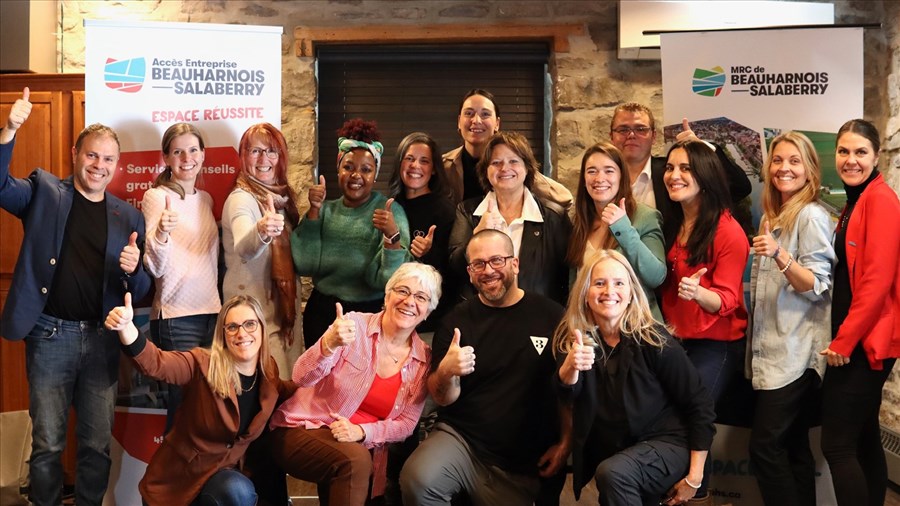Serge Boily founded the Victimes des pesticides du Québec organization
Victim of pesticides, he fights for people in his situation
Since December 2019, Serge Boily, a man in his fifties, has been on a mission: to raise awareness and inform the population of Quebec about the dangers of prolonged exposure to pesticides. Mr. Boily is one of only twenty people in Quebec to have his illness, Parkinson's, recognized as an occupational disease related to his former job.
From 1990 to 2000, Mr. Boily was in charge of treating trees, shrubs and lawns, spreading fertilizers, insecticides and pesticides. Among the products to which he was exposed during this employment were Glyphosate and Chlorpyrifos.
It was in early 2017 that the first symptoms of Parkinson's disease appeared in the father of the family, but it was in March 2018 that the doctor made the diagnosis.
"When the disease first appeared, I had no idea it was linked to pesticides, as I'd been exposed to them for over 15 years. I stumbled across the Green Week report and it just clicked in my head. Since then, I've been involved in raising awareness of the dangers and impacts of pesticides through the Victimes des pesticides du Québec organization, of which I'm the co-founder", explains the principal interested party, who lives in the Quebec City region, but was in Coteau-du-Lac on Monday October 16 for a tour with his organization.
A long process to obtain recognition of his illness
For his illness to be recognized by the CNESST as an occupational disease, Mr. Boily had to be patient." Victims need to know that as soon as they file their first claim, the answer is always no. That's just the way it is. That's just the way it is. After that stage, half the people who file a claim abandon the process.As for me, my first occupational disease claim was rejected in February 2021.I appealed and requested a review of my file. With the help of my organization, I was ready to fight and present my case to the Tribunal Administratif du Travail (TAT). In the end, the CNESST accepted my claim before taking the final and irreversible step of the TAT", he recounts. Since then, he has been receiving financial benefits from the organization and has been declared disabled for life due to his health condition.
Not all victims succeed in obtaining this status. Currently in Quebec, the only recognized occupational disease is Parkinson's linked to pesticide exposure. To be recognized, the victim must meet three criteria: have been exposed to pesticides for at least ten years, have obtained a diagnosis within a maximum of seven years of the end of exposure to pesticides, and have contributed to the CNESST during his or her lifetime.The majority of people who apply for recognition don't get it because they don't meet the three criteria, deplores the organization.
In his view, Quebec lags far behind France and other European countries. "In France, there are more diseases recognized as linked to pesticide use, such as non-Hodgkin's lymphoma, prostate cancer, skin cancer, Parkinson's disease and certain cognitive disorders and respiratory illnesses.Research also shows medium presumption links between exposure to and use of pesticides and pathologies such as bladder, kidney and soft tissue cancer, and thyroid problems.It's time to get serious about this problem in Quebec. You can wait months for your illness to be officially recognized," he says.
Many health impacts
During the Victimes des pesticides du Québec conference, Mr. Boily was joined by two other speakers.The first was Christine Dandurand of Mère au Front, a farmer's daughter.
"When I was young, my father wasn't aware of the impact of pesticides or how to use them properly. I remember him spraying our fields into the wind, and occasionally getting some directly in his face. At the age of 82, he was diagnosed with pulmonary fibrosis, possibly linked to pesticide use.He died four years later at the age of 86 ", she recounts.
For her part, Amandine François is an employee of Victimes des pesticides du Québec, and the issue touches her closely.
"I'm also the daughter of a farmer who was contaminated by pesticides.The organization's mission is not to bash the agricultural industry, which plays an essential role in our society, but to raise awareness and bring about change.We want to help people make their voices heard with the CNESST", she confides.
It should be noted that a study on the impact of pesticides on the neighbourhoods of farms that use them is currently underway. The results should be available in 2024. In a report produced by La Semaine verte and broadcast at the conference, it was shown that even wearing protective equipment does not prevent pesticide contamination by the person wearing it.In the majority of cases, the equipment is either poorly worn or not tight enough to prevent contamination through the skin.
What can be done to change things?
In the face of powerful lobbying from the pesticide industry, what is the solution? On a regional level, over the past few months, the Mère au Front organization has drafted a resolution aimed at preventing the use of pesticides on the territory of the Vaudreuil-Soulanges MRC under certain conditions.
"We've sent it to all the municipalities, but so far there's been radio silence. It has not yet been adopted in the region.We'd like municipalities to have access to registers of farmers and golf course owners who use pesticides.This document would make it possible to know how often they are used and what the products are. It would be a good start", explains Ms. Dandurand.
The message is starting to get through. In 2024, Quebec City will ban the use of harmful pesticides on its territory, except in exceptional cases.
Has Mr. Boily considered entering politics to change things? "It would have interested me, but I can't because of my health. I'm recognized as disabled for life, so it's not a solution for me", he concludes.
To contact the Victimes des pesticides du Québec organization, visit https://www.victimespesticidesquebec.org/.







